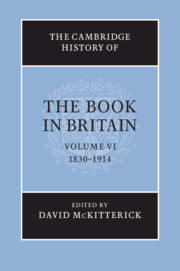Book contents
- Frontmatter
- Introduction
- 1 Changes in the look of the book
- 2 The illustration revolution
- 3 The serial revolution
- 4 Authorship
- 5 Copyright
- 6 Distribution
- 7 Reading
- 8 Mass markets: religion
- 9 Mass markets: education
- 10 Mass markets: children’s books
- 11 Mass markets: literature
- 12 Science, technology and mathematics
- 13 Publishing for leisure
- 14 Publishing for trades and professions
- 15 Organising knowledge in print
- 16 The information revolution
- 17 A place in the world
- 18 Second-hand and old books
- 19 A year of publishing: 1891
- 20 Following up The reading nation
- Bibliography
- Index
- Plate Sections
- References
Introduction
Published online by Cambridge University Press: 28 March 2010
- Frontmatter
- Introduction
- 1 Changes in the look of the book
- 2 The illustration revolution
- 3 The serial revolution
- 4 Authorship
- 5 Copyright
- 6 Distribution
- 7 Reading
- 8 Mass markets: religion
- 9 Mass markets: education
- 10 Mass markets: children’s books
- 11 Mass markets: literature
- 12 Science, technology and mathematics
- 13 Publishing for leisure
- 14 Publishing for trades and professions
- 15 Organising knowledge in print
- 16 The information revolution
- 17 A place in the world
- 18 Second-hand and old books
- 19 A year of publishing: 1891
- 20 Following up The reading nation
- Bibliography
- Index
- Plate Sections
- References
Summary
Dates
Unlike the date that marks the beginning of the previous volume in the Cambridge history of the book in Britain, the year 1830 has no exceptional significance for the trades of printing and publishing. In 1695, the last of the Licensing Acts was allowed to lapse, and with it the legislation that had (amongst other matters) prevented the expansion of printing in England outside London and the university towns of Cambridge and Oxford. The year thus marked an end to ways of thinking about the book trade that could be traced back at least to the founding of the Stationers’ Company in 1557; and it proved to be the beginning of a long period in which the eventual abolition of perpetual copyright signalled the end of control of publishing and the book trade by a cartel whose interest lay in dominating, and often restricting, growth and, frequently, in maintaining high prices.
If there is no equivalent dominating and determining event in 1830, there are nonetheless strong reasons for dividing the sequence of the history of the book in Britain at about this date. They have nothing to do with the preoccupations of historians who have seen in the passing of the 1832 Reform Bill a severance with a conservative past in favour of a period of reform under the Whigs.
- Type
- Chapter
- Information
- The Cambridge History of the Book in Britain , pp. 1 - 74Publisher: Cambridge University PressPrint publication year: 2009
References
- 3
- Cited by

